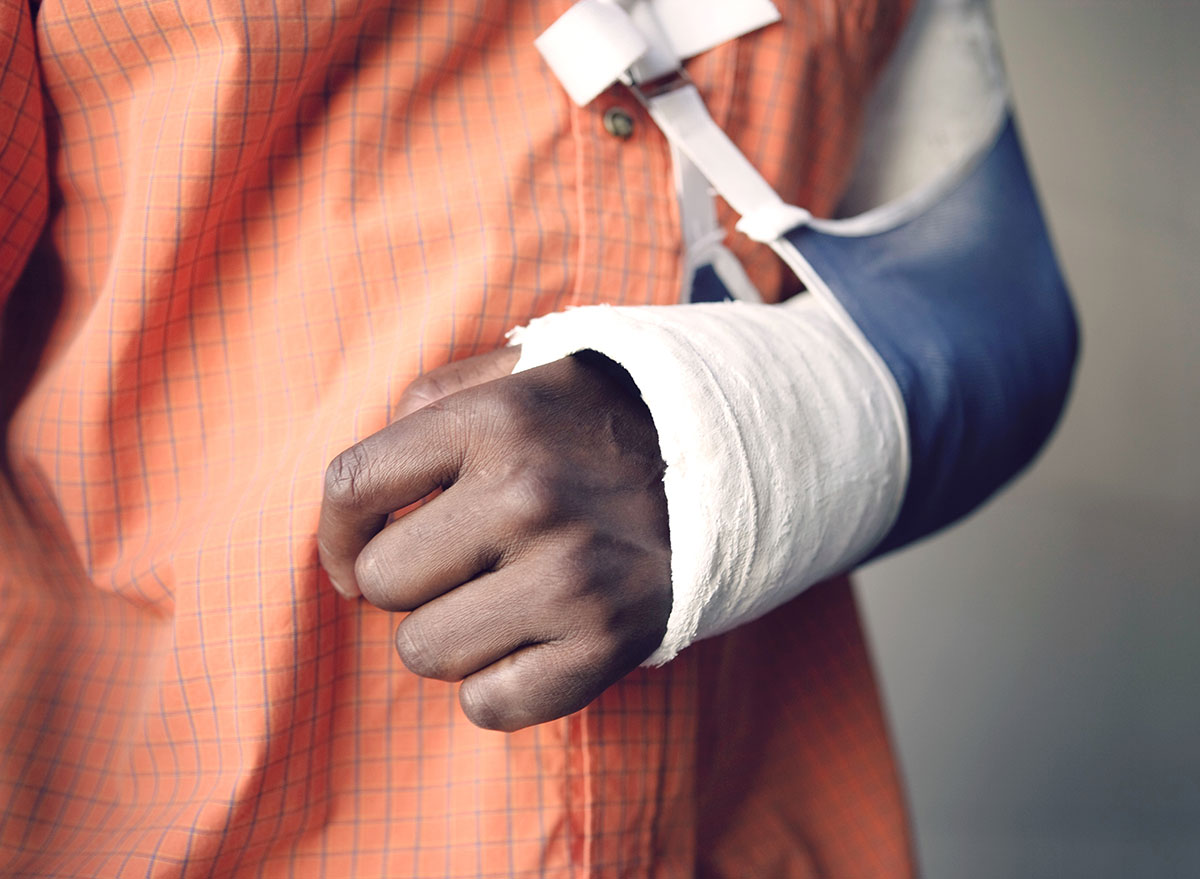Ugly Side Effects of Not Working Out, According to Science

Skipping today's workout won't kill you. But routinely skipping exercise the rest of your life will likely make your life shorter than it could be. If that little alarm bell doesn't nudge you to start taking walks, let us remind you of that eye-opening JAMA study by Cleveland Clinic Foundation researchers that made headlines back in 2018: It declared that poor aerobic fitness is a far bigger risk factor for premature death than either smoking or high blood pressure. That's why it's essential to focus on these ugly side effects of not working out and to get your body moving.
According to the Centers for Disease Control & Prevention, about 25% of adults in the U.S. don't engage in physical activity. While a quarter of us are totally sedentary, more than 60% are mostly sedentary, meaning they don't meet the recommended 150 minutes of moderately intense activity or 75 minutes of vigorous aerobic exercise per week. So if you're one of the people not getting regular physical activity, you might experience these ugly side effects of not working out. And be sure to also consult our list of 15 Underrated Weight Loss Tips That Actually Work.
A fatty liver.

Not exercising may harm your health in many ways that you can't see by looking in a mirror, stepping on a weight scale, or taking a cardiac stress test. Consider your liver, an organ that often takes a back seat to the heart when you think about getting back in shape. Recent research suggests that fat in the liver may raise the risk of cardiovascular disease and diabetes independent of outward signs of an overweight body. Researchers can measure fat in the liver through metabolic products called metabolites like dimethylguanidino valerate (DMGV) that occur within cells. DMGV is a recently identified marker of non-alcoholic fatty liver disease.
The good news is that levels of that metabolite and others associated with cardiometabolic health decrease in response to a brief bout of exercise. Scientists with Massachusetts General Hospital reporting in Circulation in 2020 explain that just 12 minutes of cardiopulmonary exercise (like walking, running, or cycling) affected certain metabolites connected to long-term health. DMGV, which is associated with the risk of diabetes and liver disease, dropped by 18% while glutamate, a metabolite linked to heart disease, diabetes, and decreased longevity, fell by 29%.
Need more motivation? Here are 5 Underrated Benefits of Exercise.
Muscle shrinkage and strength loss.

One of the ugliest side effects of not working out, even for only a few weeks, is that we quickly lose the benefits of all the exercise we previously did. Loss of aerobic fitness is compounded by the fact that as we age, we tend to shrink.
"As people get older there's a progressive decline in the amount of muscle mass and strength," says Roger A. Fielding. PhD, the senior scientist of the Nutrition, Exercise Physiology, and Sarcopenia Team at Tufts University's Jean Mayer USDA Human Research Center on Aging. "We know for sure that these losses in muscle and strength are strong drivers of the loss of ability to perform the tasks of daily living, like climbing stairs and getting out of a chair. Those changes can reach a point where people lose the ability to live independently."
Fielding's research, however, has shown that even physically frail older adults who engage in a moderate program of resistance exercise can gain back strength and improve mobility.
"I think it's important to consider incorporating some strength training into our physical activity routine to slow down the progression of that decline in muscle and strength," Fielding says.
Here are 25 Easy Exercises That Make You Feel Better.
Lower 'good' cholesterol.

Refraining from physical activity is a great way to send your HDL cholesterol south. High-density lipoprotein (HDL) is the so-called "good" cholesterol that removes the bad cholesterol LDL or low-density lipoprotein from your bloodstream so the LDL won't form dangerous plaque. If you don't have enough HDL, you'll likely have too much LDL. Many studies have shown a correlation between high HDL numbers and lower rates of heart disease. And one of the best ways to raise HDL is to do regular vigorous exercise.
Here are the 15 Worst Foods for High Cholesterol.
Constipation

If you don't get up and go every day, you may find it difficult and painful to go every day. Inactivity can lead to constipation even if you have no other health issues. In a study by the Italian Space Agency published in PLOS One, 10 healthy men were assigned to 35 days of experimentally controlled bed rest to study the effect of long-term physical inactivity on constipation. The result: 60% of participants experienced significantly increased flatulence while bowel movement frequency decreased during week-by-week comparisons.
If you want to avoid getting backed up, try taking a long walk before reaching for the prune juice. "Regular exercise can help keep stool moving through the colon," says gastroenterologist Linda Ann Lee, MD, chief of staff at Johns Hopkins Aramco Healthcare.
Incorporating fiber into your diet can also help with going to the bathroom! Here are 9 Warning Signs You're Not Eating Enough Fiber.
Depression

Psychologists and psychiatrists call it the "inactivity trap". If you're depressed you often have little energy and interest in participating in regular physical activity and, on the other hand, if you stop exercising regularly, you may experience depression symptoms. Whether you are feeling depressed or not, it seems the best prevention is getting sweaty.
Exercise releases feel-good chemicals called endorphins into the body, which can decrease stress. It can help you get to sleep quicker and sleep more restfully. And it boosts self-esteem and confidence and can keep your brain positively engaged so you aren't dwelling on the negative. An analysis of dozens of observational and intervention studies suggests that physical activity could prevent depression. While some of those studies showed that low- and high-intensity physical activity were both effective at reducing the likelihood of depression, a number of studies found that vigorous exercise had the greatest preventive effect.
Hypertension

Regularly stressing your heart through exercise builds a stronger heart that can do its pumping job with less effort. When that occurs, the pressure against the walls of your arteries decreases; that's good for cardiovascular health. But when you don't exercise, your heart has to work harder, and your arteries can suffer. A study of more than 3,800 men without high blood pressure who were monitored for 10 years found that those who got out of shape through inactivity over the decade had a 72% increased risk of developing hypertension than participants who increased their aerobic fitness.
Get even more healthy tips straight to your inbox by signing up for our newsletter!
Higher blood sugar levels.

Exercise plays a significant role in your metabolism. It affects how your body processes carbohydrates so powerfully that even missing a few workouts can impair control of blood sugar levels and increase the risk of insulin resistance, according to recent research in the journal Medicine & Science in Sports & Exercise.
Brittle bones.

Like your muscle, your bones can become weaker with age, and skipping exercise can exacerbate that problem. The condition, known as osteoporosis, occurs when calcium from bone is absorbed into the bloodstream, making it brittle, one of the worst ugly side effects of not working out. The American College of Sports Medicine recommends weight-bearing exercises that involve jumping (like tennis and basketball) and running. Resistance training with weights is also recommended to increase bone density by the National Strength and Conditioning Association.
Speaking of bone health, here are 15 Things That Put You At Risk for Osteoporosis.








